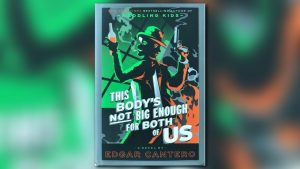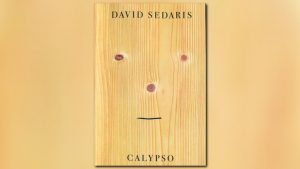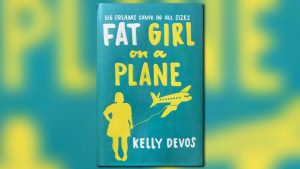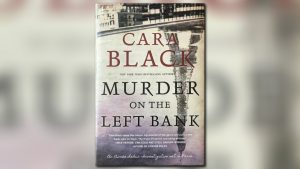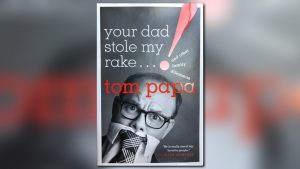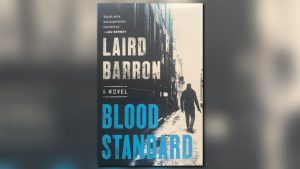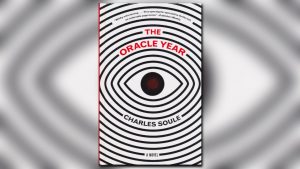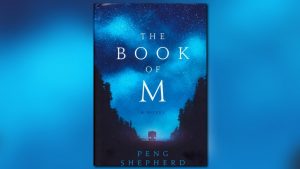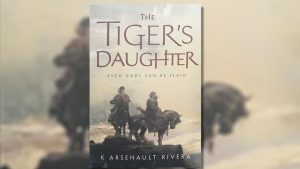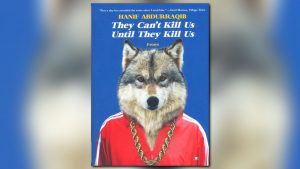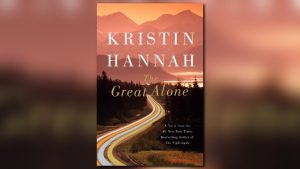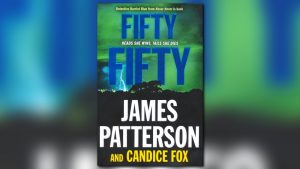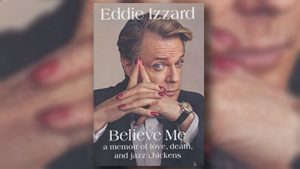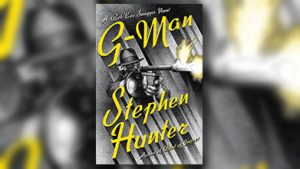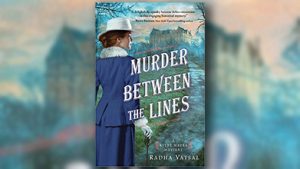Where All Light Tends To Go follows eighteen-year-old Jacob who has been instructed by family tradition to commit a murder.
However, when he botches the murder he must choose between appeasing his father or leaving with the girl he loves.
Where All Light Tends To Go tests if blood is thicker than water.
VOICEOVER: And now, an Eight original production. "Books & Co." is made possible by the Department of English at Arizona State University. And by the Friends of Eight, members of Eight Arizona PBS, who give additional gifts to support original programs. Thank you.
ALBERTO RIOS: Welcome to "Books & Co." I'm your host, Alberto Rios. We're joined by David Joy, talking about his newest book, "Where All Light Tends to Go." Welcome, David.
DAVID JOY: Thank you for having me.
ALBERTO RIOS: I just -- I don't know where to begin with this book. It is an emotionally overwhelming book. You take us through it, part by part. You earn big emotion by the end, but let's start at the beginning. Give us a little synopsis of what the book is about.
DAVID JOY: I have a hard time wrapping it up. I think Ron was right in the sense he said it was about a 18-year-old boy trying to transcend a family's legacy of drugs and violence. I think that is the elevator pitch.
ALBERTO RIOS: I think it's a good one. We can use those words I think very easily. But this is them fleshed out. This is the experience.
DAVID JOY: Yes.
ALBERTO RIOS: And it is something to be reckoned with and he has to live through it.
DAVID JOY: Yeah.
ALBERTO RIOS: It takes place in -- I don't want to say an unlikely place. I don't know enough about North Carolina, which is where it happens, to say, but you certainly have found a place and a town and I don't know -- it is a real town, I think.
DAVID JOY: Yeah, yeah, Jackson County is where I live. At the time that I was working on this, I lived in Cashiers, which people say that this is set in Cashiers. The reality is it’s more set in the Glenville area which is right against Cashiers..
ALBERTO RIOS: Glenville Lake and other things that you refer to.
DAVID JOY: Exactly. It is set specifically in Jackson County, to the point that there are a lot of things in that book, if you went there you would see them. The restaurant they eat at, coffee shop, you know, been there since the 1920s, or, you know, the cemetery where Jacob goes and the fact that the flowers, blow down the hillside, gather in the ditch. That's really there.
ALBERTO RIOS: It happens.
DAVID JOY: Yeah.
ALBERTO RIOS: You have this character, main character Jacob, and a girl that he likes, Maggie, and I don't know who the biggest characters -- you can make an argument for a number of them. Daddy, his father, is certainly a big-time player here. And then his mother, who is a difficult case. It is not an Italian mob story, but the family ties here are extraordinary. Maybe you could just talk about them a little bit.
DAVID JOY: I think family ties in Appalachia are extremely important, you know. If you were to say you were from Appalachia, you were to say you are from Jackson County, my first question is going to be “What is your last name?” That will say a lot about you, it says an awful lot about Jackson County specifically. The Southern end of the county there’s a whole lot of families there that might not be at the Northern end of the county. And, so, you know, it's a place that is very seeded in surnames, and not only that, you know, the family ties continue in the sense that where I live, people grow up to do the work of their fathers. So, you know, if your father runs equipment, then you learn to run equipment. If your father is a stone mason, you become a stone mason. And in the same sense, there are families there who have always been outlaws. And, so, I think that's what we're seeing in the novel.
ALBERTO RIOS: You say that almost at the beginning. You say, “I was a McNeely,” Jacob talking, “in this part of Appalachia, that meant something.” Outlawing was just as much a matter of blood as – hair color and weight.
DAVID JOY: Yeah.
ALBERTO RIOS: And it is no laughing matter, whether that is a comfort or an obstacle, though, how do people think about it?
DAVID JOY: I don't know. Where I got that line kind of was there was this family that a deputy was telling me one time in this family, you know, kept getting arrested over and over for years even, and he was really disheartened because he had pulled this man over, and he said that the -- that the man had a son in the back and the son was about six years old, and he turned around and looked at his son and he said, you need to get used to this because you're a so and so, whatever this -- the last name was. And that's the truth. If you look at the newspapers in a place that small, it's the same people getting arrested over and over and over, week after week. You know, when crime takes place in Appalachia, it's close to home because if we don't know them, we know their family. We go to church with their parents. So, it's not that there is more crime there, it's that it hits closer, it resonates.
ALBERTO RIOS: And that idea of cycles is a difficult and interesting way of life.
DAVID JOY: Yeah.
ALBERTO RIOS: Happens over and over. I think this book has been referred to perhaps by you as Appalachian noir.
DAVID JOY: Yeah.
ALBERTO RIOS: Could you talk a little about a term like that? I mean, we could categorize it all sorts of ways. It doesn't matter. It is about a place and it is a way of talking about that place.
DAVID JOY: Yeah. I came up with that term as a marketing strategy when I was trying to sell it because of – Daniel Woodrell had come up with the term country noir and he came up with that term for the novel "Give Us a Kiss." My novel is very much coming out of an obsession with Woodrell and specifically his novels "Tomato Red” and “The Death of Sweet Mister.” When I was trying to market the book, I was thinking about ways to do that and so I came up with the idea of Appalachian noir, which I think fits. At the same time, Daniel kind of eventually distanced himself from the term because you know, there is a bunch of things that go into noir that he didn't think defined his work, and in some ways I feel the same. I think that the traditional noir writers are rooted in literature that at times I'm not familiar with. Very much coming out of a vain of Larry Brown or William Gay or Ron Rash.
ALBERTO RIOS: I think this fulfills whatever they were attempting just on its own terms.
DAVID JOY: Yeah.
ALBERTO RIOS: I don't see an argument there at all. I think it is a great term. I think it's useful.
DAVID JOY: Thank you.
ALBERTO RIOS: In talking about this. And noir, which, you know, dark, this is a dark book on a lot of levels, but it is a book about getting through life, and we feel some pain as we follow Jacob with what he has to face and the cycles that he's going through. He wants to break out of it.
DAVID JOY: Yeah.
ALBERTO RIOS: Now, that's an interesting problem. It's probably as age-old as literature itself.
DAVID JOY: Right.
ALBERTO RIOS: And human beings. The cycle is big.
DAVID JOY: Yeah, I don't think, you know, the biggest things involved in this novel are the ideas of hope and the idea of fate, and they're wrestling back and forth with one another. And, so, I think that's indicative of a lot of kids that I grew up with, and I think it is indicative of people who come out of poverty. You know, the reality is that hope takes a back seat to fate. Circumstance wins in a lot of cases. You know. There is -- there is one moment where Jacob says, “You know, the bad thing about dreaming is that eventually you have to wake up.” And I think that's, you know, that's true for him and I think it's true for a lot of people. It's easier just to not hope.
ALBERTO RIOS: Yeah. And part of that is manifested in drugs and, just not working and -- it is a variety of things. There is no one thing. It is just a little bit of everything. And for Jacob, he's a good guy. Down deep we know he is a good guy but all of this bad stuff happens and he is a part of a lot of that bad stuff. But we as readers were following him and we begin to, I would say, trust him or believe him, but when we stand back, we also say, man, what did he just do? Did he really do that? That's a hard -- that's a hard moment of reckoning. It’s where that noir idea sort of comes in.
DAVID JOY: Yeah, I think it's important if you are going to write about crime and you’re going to write about criminals, to humanize their actions. I think that we, as a society, distance ourselves from what we see on the nightly news, you know. We see something and we see it as horrific and, you know, we categorize these people as animals and inhuman and we distance ourselves from them. The reality is that they’re people just like us caught up in crazy circumstances.
ALBERTO RIOS: Uh-hmm.
DAVID JOY: So, I think that's important in everything that I do, but especially this working with Jacob. Jacob is not cut out for the world that he's in. He's not cut out to be surrounded by the type of violence that he is surrounded by. And because of that, there is this struggle, and that, you know, that struggle is what -- and that tension is what I think makes it a good novel.
ALBERTO RIOS: Yeah, and makes this a good novel. He’s not cut out for it, but as a result, he is always being tested because of that. Almost more so than other characters -- by his father, especially.
DAVID JOY: Yeah.
ALBERTO RIOS: So he is finding himself in the middle of doing not what he wants to do, but what he's got to do on some level and it's just the law of this place.
DAVID JOY: Yeah.
ALBERTO RIOS: Right.
DAVID JOY: Yeah.
ALBERTO RIOS: I wonder, what brought you to fiction and this story in particular. Maybe it is not fiction.
DAVID JOY: This book is very much fiction. I think I was always moving towards the novel. I wrote a lot of non-fiction for a long time because I was studying with this really great memoirist and essayist named Deidre Elliott, and because of that, I focused on non-fiction for a really long time, but I always knew, even while I was doing that, that I was headed towards the novel. I think in my heart of hearts, I would have rather been a short story writer, or a poet. I'm good at neither, you know, and so I was always moving towards the novel. As far as how this book came about, I was standing with a friend of mine at his hog lot and he was telling me this story about hunting pigs. I had this very specific image. It appears in the book about page 200, I think, but of this young boy standing over a pig that he had killed. And he was recognizing how much power he had over life and death. And I lived with that image for a very long time. That was the first thing I wrote. It happened about two-thirds into the book.
ALBERTO RIOS: Haunting image in the book. That squealing that he is talking about.
DAVID JOY: Yes, yes. And that image is where the whole thing came from. You know, originally I wrote somewhere around 50 pages and it wasn’t right and I burned it. Next time I wrote somewhere around 40,000 words, half a novel, it wasn't right, and I burned it. And then that next time, you know, I kept living with that image and so I knew it was significant, and then one night I just woke up and he was talking. And then it was time to really pay attention.
ALBERTO RIOS: That was the novel itself talking to you.
DAVID JOY: Yeah, yeah.
DAVID JOY: That's a great approach. As a writer, I don't think there is anyone way to write a book.
DAVID JOY: No. I don’t either.
ALBERTO RIOS: It sounds like it grew from something and grew from the right thing for this book and sometimes that's hard to know.
DAVID JOY: Yeah. I think you have to give, you know, you have to give a book room to breathe and become its own thing, you know. The book I just finished is the same way, you know, the way it started and what it became are two entirely different things. And if you don't give -- if you don't give the characters and the story line that type of freedom, I think you wind up forcing things, and it loses its fluidity.
ALBERTO RIOS: I would like to take a moment to remind our viewers, you're watching "Books & Co." I'm your host, Alberto Rios, joined by David Joy, talking about his first novel, "Where All Light Tends to Go." Let me ask you a question about humor. There is not much of it in here.
DAVID JOY: No, no.
ALBERTO RIOS: How do you keep readers -- I think that is a very contemporary notion that we have to have some humor and something for the reader. You don't buy into that. There are humorous moments, I think, but they are a little few and far between.
DAVID JOY: Yeah, and it is dry, rigid --
ALBERTO RIOS: Yeah.
DAVID JOY: But I think, you know, typically when you are mixing humor with something like what I'm doing, a writer I think that is great doing that is George Singleton. George Singleton writes some of the funniest short stories in America, but he is mixing these very hard life-styles with it and it is that balance that makes the short stories so beautiful. For me, it was important -- that's what happened with Maggie. And that was done in the revisions. That was something that my editor saw. Early on, when I -- when I -- my initial revision strategy with that novel, I said I'm going to treat it like a house and I'm going to walk all over it and turn every light out and I did. And it was one of the darkest things that I've ever read. And the problem with that is like you said, you know, readers need something to latch on to. And, so, we worked to develop an idea of hope, and, so, it -- and that's the balance is that up until the end, I want you to remain hopeful that things can work out. Even if in the back of your mind you think nothing good is going to come of this. That is the interesting thing about hope is that, you know, even when we -- even if we were to have a bleak outlook on the world, it's these tiny things that keep us going.
ALBERTO RIOS: Uh-hmm. You mentioned the ending, we won't give the ending away, but it is a difficult ending. On par with what happens in the book. And what I find most intriguing about that ending is how much I've come to believe the narrator. And, so, the ending surprises us because it surprises the narrator, and I think you did a good job of bringing us along in that moment. Did you plan that?
DAVID JOY: No, and I think that is a major difference between commercial fiction and literary fiction, and that is not to say that one is better than the other or anything else. That is just to say that they work differently. And I am incapable of doing it the other way. So, what I like to do is I come up with a character, and I, you know, I learn the character inside and out to the point that even if he doesn't order coffee in the book, I know what kind of coffee he would order. And you have to know him in that fashion. Once that happens, matter of throwing him into a situation and seeing what takes place. You can throw them into any situation. I think that is the fun as a writer, to put them into some type of scenario and see what plays out. So, because it was character-driven, up until the end, I had no clue what was happening.
ALBERTO RIOS: I'm glad to hear that. It makes me trust you as a writer more because I trusted that narrator in the way that I think you probably did, and, you know, things happen. When I was talking about humor earlier, I have to say, I mean, I don't know what the word is for it, but there is something, and you call it hope. You have a line, for example, there were a number of lines like this, but it is a complex humor. It is a kind of hope. This is not hopeful necessarily, but, yet it is. “That was one of the few times you have been proud of me.” Talking to -- Jacob talking about his dad. So, this is kind of a positive thing. “I could count those times on one hand, even if I lost two, three fingers in a saw mill.” I'm kind of laughing, but -- and he is kind of hopeful, but, man, this is tough.
DAVID JOY: And that's Appalachian humor, is this dry sense of humor, like I heard this guy the other day say, talking about how skinny this woman was because of drugs, and you know, he said she is skinny as a skinned out squirrel. That's Appalachian humor.
ALBERTO RIOS: And you probably have a few more. Going from the humor in it, and you -- you mentioned hope, maybe you could talk about the title a little bit. I know what it refers to ultimately in the book, but it is a haunting title ultimately, and it haunts us even more after we read the last page.
DAVID JOY: Yeah.
ALBERTO RIOS: How did you come to it?
DAVID JOY: It's really strange, because I didn't -- I knew the title before I --
ALBERTO RIOS: "Where All Light Tends to Go," right?
DAVID JOY: I knew that title before I ever wrote a word, but I didn't write towards it. And so there is a moment in the book where, you know, where you discover why that title exists and I think that's a very -- I think readers really like getting to that moment in the book. But I wasn't ever trying to write toward it. And it doesn't give anything away in the novel, but ultimately what it is is it comes from this -- there is an Aldo Leopold essay where he is talking about hunting wolves – it’s in “The Land ethic” -- he shoots this wolf and he gets up to it right as the wolf is dying and he talks about watching the green fire burn out of its eyes. And I think if you have been around death, you -- you watch the light go out of something's eyes, and so Jacob is sitting there and he is trying to conceptualize a place like heaven, and he is trying to conceptualize something as hopeful as God, and the only way that he knows how to do that is by trying to imagine a place where that light doesn't vanish, where it goes out and where it gathers again. The place where all light tends to go kind of becomes this, you know, this idea of heaven.
ALBERTO RIOS: And he’s reminded by it by this curious picture that is on the wall that he keeps seeing and he keeps referring to it. It has nothing to do with the plot, that is to say the action of the plot, but it has everything to do with the plot in terms of his feeling about how to go on. It is an interesting thing to watch. And he is seeing that moment, we had that pig scene before, so it is in the book. You address it in important ways. You know, you said something earlier about not being good at poetry or short story, but you have poetic feeling in here slipped in, and none of it slipped past me. I have to say, I appreciated what were the occasional moments, it wasn't overstuffed or whatever, but you had such small little nicely turned phrases, few and far between, so that when they happened, they happened big. And a good one was, “The great platform circling the water tank had lost all but a few screws and curled up at the edges like a twice read book.” That phrase, “like a twice read book.” Is that part of your speech patterning – is it something you know you had created – small moment?
DAVID JOY: I think it is the type of attention to language that is, you know, evident in the writers that I'm rooted in. And, so, for instance, a writer like Ron Rash, Ron Rash is, you know, a terrific novelist, but more than that I think he is a poet and short-story writer. You think of somebody like Cormac McCarthy, that opening to “Suttree” is one of the most musical pieces of language that I have ever read. The novel is his form. But just because the novel is your form, doesn't mean that you're not paying attention to the details. I think most novelists, we're obsessed with poets and short-story writers.
ALBERTO RIOS: Sure.
DAVID JOY: I think it is because -- what you can do in those constraints. What you are able to do within something this big takes me something this big.
ALBERTO RIOS: Although, now that brings us to the last chapter where I think you were paying attention to language in a way different from the rest of the book. Maybe you could talk a little about that.
DAVID JOY: Yeah, well, I think Silas House said one time, and I think he was borrowing a line from James Steele, but he said, “Every sentence needs to be a poem.” And I think that's true. But the problem with that, when you are working with a manuscript, a novel is typically 70,000 to 90,000 words, not that you are not paying attention to those things, but there comes a time where you are not paying attention to things like articles for instance. But when I reached the end of that book, you know, I was obsessed with every single word, to the point that the last nine hours working on that book was spent on the last paragraph. And I changed every word over and over until it was music and that's the closest thing I have ever written to either music or poetry is the last chapter of that book and every word that is in that chapter is meant to be there. You know, it is not that the writing in earlier in the novel I'm not paying attention, because I am paying attention, but it is a lot more specific. It's the type of detail that I think that's what people mean when they talk about a poet's eye.
ALBERTO RIOS: You do it so wonderfully there.
DAVID JOY: Thank you.
ALBERTO RIOS: No, thank you. I think that ending, again, I don't want to give anything away, but it is a surprise. And, you know, you're using regular language, but you bring us to a moment that is like a crescendo, something happens in it that I think is worth, you know, talking about, that shift, it is like a shift in gears. And that's an exciting thing to feel as a reader, but it also makes me wonder about the narrator, not wonder about the book. Suddenly I realize that I am working with an unreliable narrator, but not because he doesn’t know what’s happening, he does and we believe him. We’re all kind of wrong -- I think that is an interesting situation for you to put us in as readers.
DAVID JOY: I think that is accurate of an18 year-old narrator. At 18 years old, you know everything. You look back when you're 25 and you realize you knew nothing. And then when you get to 30, you look back at 25 and realize you knew nothing, and I think that's the, you know, the interesting thing about life but I think when you're writing about a – 18 year-old narrator and you're writing from that perspective, it needs to come that way. He's dealing with really big issues, but he's not equipped -- to be honest a grown man wouldn't be equipped -- to deal with the types of things that he's dealing with. And, so, I think that the ending does come as a surprise to him.
ALBERTO RIOS: Uh-hmm.
DAVID JOY: And, you know, as you're saying, it is not -- it's not an unreliable narrator in the sense that he is lying to you, he's not. He is telling you the only truth that he knows. But the reality is that that truth -- he is incapable of wrapping his mind around it.
ALBERTO RIOS: Thank you, David. This was a wonderful book to talk about. Difficult, important book to read. And so I recommend it. I want to thank our viewers for joining us today. You have been watching "Books & Co." My name is Alberto Rios, I’m the host, we’ve been joined by David Joy, talking about his first novel, "Where All Light Tends to Go."
DAVID JOY: Thank you for having me.
ALBERTO RIOS: Join us again next time when we will be bringing you another good book.
VOICEOVER: "Books & Co." Is made possible by the Department of English at Arizona State
University. And by the Friends of Eight. Members of Eight, Arizona PBS, who give additional gifts to
support original programs. Thank you.








